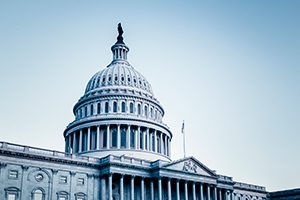Artificial Intelligence Sparks the Interest of Federal Policymakers
 A growing interest in artificial intelligence and its potential impact on the workforce has sparked action by policymakers at the federal level. As employers increasingly turn to AI to fill workforce gaps, as well as improve hiring and overall job quality, policymakers are seeking federal policies to better understand the use and development of the technology. Recent policies include an executive order from the Biden administration and a Senate committee hearing on AI, both of which are detailed below.
A growing interest in artificial intelligence and its potential impact on the workforce has sparked action by policymakers at the federal level. As employers increasingly turn to AI to fill workforce gaps, as well as improve hiring and overall job quality, policymakers are seeking federal policies to better understand the use and development of the technology. Recent policies include an executive order from the Biden administration and a Senate committee hearing on AI, both of which are detailed below.
Executive Order on AI Use and Deployment
On October 30, the Biden Administration released an executive order delineating the “Safe, Secure, and Trustworthy Development and Use of Artificial Intelligence.” The order urges responsible AI deployment that satisfies workforce development needs and ethical considerations.
The executive order directs several agency heads to issue guidance and regulations to address the use and deployment of AI and other technologies in several policy areas. Some orders of particular interest to higher education HR include:
- The secretary of labor is directed to submit a report analyzing ways agencies can support workers who may be displaced by AI.
- The secretaries of labor, education and commerce are directed to expand education and training opportunities to provide pathways to careers related to AI.
- The secretary of labor is ordered to publish principles and best practices for employers to help mitigate harmful impacts and maximize potential benefits of AI as it relates to employees’ well-being.
- The secretary of labor is directed to issue guidance clarifying that employers using AI to monitor employees’ work are required to comply with protections that ensure workers are compensated for hours worked as defined under the Fair Labor Standards Act.
- The secretary of labor is directed to publish guidance for federal contractors on nondiscrimination in hiring practices that involve the use of AI and other technology.
- The director of the National Science Foundation is directed to “prioritize available resources to support AI-related education and AI-related workforce development through existing programs.”
- The secretary of education is ordered to develop resources and guidance regarding AI, including resources addressing “safe, responsible and nondiscriminatory uses of AI in education.”
- The secretary of state is ordered to establish a program to “identify and attract top talent in AI and other critical and emerging technologies at universities [and] research institutions” and “to increase connections with that talent to educate them on opportunities and resources for research and employment in the United States.”
- The secretary of homeland security is directed to continue its rulemaking process to modernize the H-1B program and to consider a rulemaking that would ease the process of adjusting noncitizens’ status to lawful permanent resident status if they are experts in AI and other emerging technologies.
The executive order directs the agency heads to produce their respective guidance and resources within the next year. As these policies and resources begin to roll out, CUPA-HR will keep members updated on any new obligations or requirements related to AI.
Senate HELP Committee Hearing on AI and the Future of Work
On October 31, 2023 the Senate Employment and Workplace Safety Subcommittee held a hearing titled “AI and the Future of Work: Moving Forward Together.” The hearing provided policymakers and witnesses the opportunity to discuss the use of AI as a complementary tool in the workforce to skill and reskill American workers and help them remain a valuable asset to the labor market.
Democrats and Republicans on the committee agreed that AI has the potential to alter the workforce in positive ways but that the growth of the use of the technology needs to be supported by a framework of regulations that do not smother its potential. According to witnesses, employers using AI currently face a patchwork of state and local laws that complicate the responsible use and growth of AI technologies. They argued that a federal framework to address the safe, responsible use of AI could help employers avoid such complications and allow AI use to continue to grow.
Democrats on the committee also asked whether education opportunities and skills-based training on AI can help provide an employment pathway for workers. Witnesses argued that AI education is needed at the elementary and secondary level to ensure future workers are equipped with the skills needed to work with AI, and that skills-based training models to reskill workers have proven successful.
CUPA-HR will continue to track any developments in federal AI regulations and programs and will inform members of updates.


